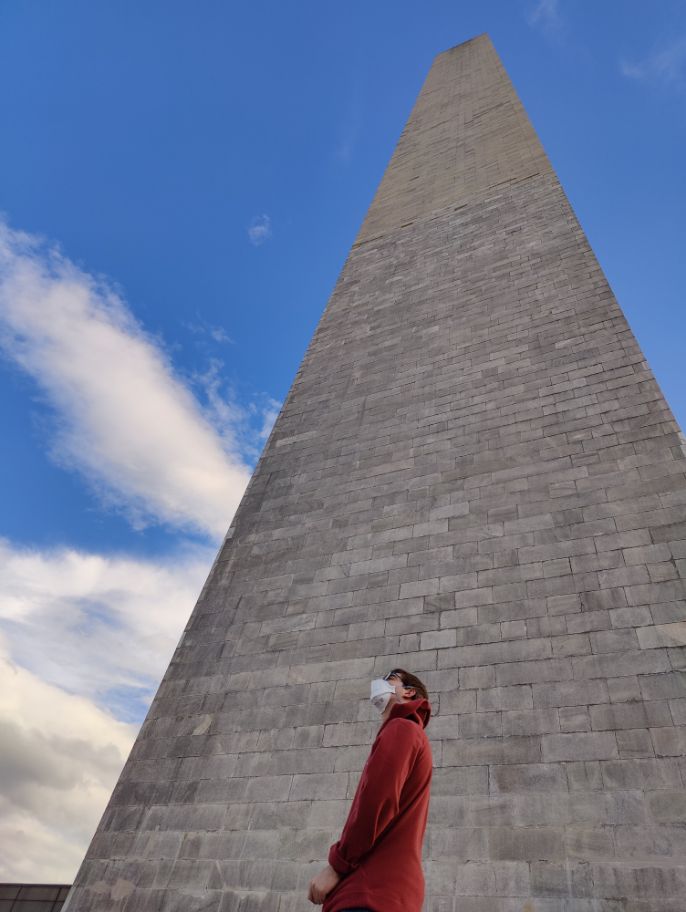This story was told to CreakyJoints by Derek Schmitz, an 18-year-old author, accessibility consultant, and queer, non-binary, disability advocate living in Alabama. Derek was born prematurely and had a traumatic injury at birth resulting in cerebral palsy. In 2020, Derek was diagnosed with spondyloarthropathy, localized in their hips, and sacroiliitis in their back.
Derek recently spent a day in Washington, DC, with colleagues from the Council of State Government’s Center for Advancing Policy on Employment for Youth (CAPE-Youth), a Department of Labor initiative that seeks to improve employment outcomes for disabled youth and young adults. Derek’s passion for disability rights and motivation to fight for policy changes exemplifies them as a role model for others.
Recently, I spent a day in DC at the Department of Labor (DOL) with government officials to communicate how to support disabled youth transitioning to the workforce. My day in the historic Great Hall was the most empowering event I have engaged in thus far.
My colleagues from CAPE-Youth and I participated in a morning of programming while a few of my peers spoke with a high-profile Office of Disability Employment Policy staffer on a panel about different employment issues. We then headed to lunch, where I networked with a representative from Social Security and one cool DOL staffer I’m glad to have in my corner as a connection.
We spent the afternoon back in the Great Hall networking. We also discussed how to best work with disabled youth, what barriers exist for employment-seeking disabled youth, and how to maximize their engagement in the workforce. I am hopeful that these conversations will impact policy and that we, as young disability advocates, will continue to be involved in these discussions and help modify the perception of disabled workers.
It is quintessential that young advocates, like myself and my colleagues, have a seat in these spaces and conversations. I applaud the DOL and the CAPE-Youth program staff for creating that space and letting us express ourselves. Disabled youth know our demographic best and understand how we need help. When people talk about disabled youth, we deserve to be included in those conversations and in the decisions that acutely impact our lives and futures.
As a young disabled advocate, I do not take my position, my privilege, or my influence for granted. Sharing my stories, fighting for other queer and disabled youth, and using my voice to fight for important policies are how I give back to the amazing communities who took me in with open arms.
I wake up every morning at 5 am sharp. Immediately, I check work emails, draft Twitter threads related to advocacy, draft blog posts on advocacy topics, and spend the day in meetings and calls related to disability with people in the public and private sectors. Disability advocacy is often grueling and all-consuming, especially when we are disabled ourselves. I’m privileged enough to have the resources and time to do everything I do, but it’s important to emphasize that all disability advocacy is valuable and important, no matter how much time, energy, or resources one has to offer.
As discrimination runs rampant, current and future advocacy efforts are essential for the inclusion of disabled and queer people. We work collectively to do everything possible to ensure the world is accessible for disabled people and that our rights are protected and bolstered, not stripped away.
All the work I’m doing now makes me immensely excited for the future, both for my personal prospects and for the future of the world and disability inclusion. I dream of a world where disability is “normal” and celebrated. I want to help make that dream a reality. It’s why I work so hard and advocate as fervently as I do — and I don’t plan on stopping anytime soon.
Our work continues. We don’t need to wait for a future where we are all recognized, accommodated, and celebrated; we can build it.
The thoughts and reflections in this piece are my own and have not been reviewed by anyone in government, nor do my words reflect the views or policies of the U.S. Department of Labor or imply endorsement by the U.S. Government.
You can read more about Derek’s journey here.
Be a More Proactive Patient with ArthritisPower
ArthritisPower is a patient-led, patient-centered research registry for joint, bone, and inflammatory skin conditions. You can participate in voluntary research studies about your health conditions and use the app to track your symptoms, disease activity, and medications — and share with your doctor. Learn more and sign up here.
If you’re interested in being a patient advocate with ArthritisPower and helping our efforts to engage more diverse patient groups in research, check out our Patient Engagement Advisor Program.






